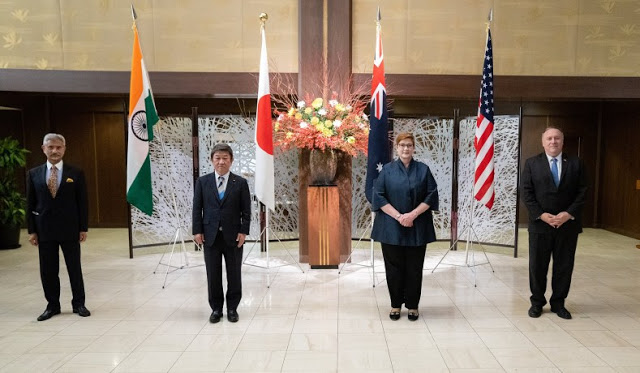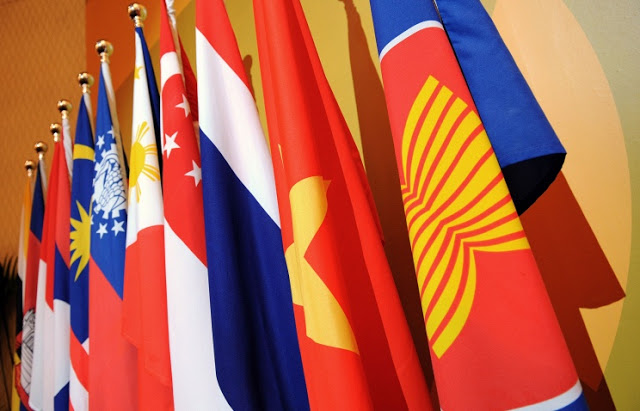The Quadrilateral Security Dialogue or “Quad” as it’s been referred to is a US-led bloc created in 2007 consisting of the US itself, Australia and supposedly Japan and India.
The bloc, whatever its stated purpose is for being, is clearly an anti-Chinese project created by and for the US and at the absolute expense of the other 3 members.
The fact that it has been “revived” by US Secretary of State Mike Pompeo after its creation during the administration of former US President Barack Obama helps illustrate the continuous nature of US foreign policy despite who occupies the White House and that unelected interests rather than America’s elected representatives drive (and will continue to drive) this anti-Chinese policy regardless of who wins America’s elections in November.
The Western media has attempted to claim China’s growing “assertive” nature is at the root of recent, deteriorating relations between it and the Quad, but the truth is blatantly clear to see. In each case, from Australia to India to Japan, it is the US creating and exploiting crisis after crisis to poison any potential form of cooperation with China amid its own self-inflicted trade war with China.
So costly is this strategy of tension created and exploited by Washington on membership in this bloc that even Australia has flip-flopped over its willingness to commit to it. Because of its ultimately unsustainable nature, it seems a matter of when, not if this recent sprint ends once again in a winded America surrounded by frustrated allies.
Australia Wrecking Ties With China to Please Washington
At the moment, Australia is in the middle of one of its more zealous stages of support for the project creating tensions with China based on unfounded accusations originating in Washington.
Australia’s behavior has resulted in a quickly expanding tit-for-tat battle between itself and China targeting areas of economics, the media, academia and even tourism. For China, it has many options when it comes to trading partners and destinations for its students and tourists. For Australia, who counts China as its largest trading partner, finding alternatives range from difficult to impossible. The remaining Quad members, the US, Japan and India, are far from anything resembling such an alternative meaning that for Australia to fully commit to confronting China, it must fully commit to permanent economic decline and all the related consequences it implies.
The final outcome of Australia’s current diplomatic posture towards China will be economic decline coupled to America’s own regional and global decline making its current strategy senseless; a needless self-inflicted display of loyalty to Washington for what can only be assumed are personal gains being made by the political forces involved at the expense of both Australia’s wider economic prospects and the Australian public whose lives and futures depend on those prospects.
India Missing Opportunities for 21st Century Ties to Help America Cling to 20th Century Empire
India has had its own ups and downs with China for decades. Clashes earlier this year were not the first and may not be the last. However, with these recent clashes, Washington’s eagerness to egg on India to expand rather than defuse tensions couldn’t have been more obvious. In other words, Washington has India playing chicken with another nuclear-armed neighbour which also has an economy many times larger India’s.
Like with Australia, China can weather tensions with India better than India can with China. As even Western analysts promoting Washington’s Quad project across the media have noted, China is creating extensive economic and infrastructure networks all around India.
Beijing has expressed an eager willingness to include India in these expanding networks, but because of certain factions within India’s government committed to Washington’s strategy of tension, it has so far stubbornly refused.
Like with Australia, the entire nation of India will suffer and decline as long as it couples its future with a likewise declining United States.
For India, it has the opportunity to counterbalance China’s regional rise with a partner invested in the success and prosperity of both India and China; namely Russia. India already enjoys close ties to Russia. Russia is also a close partner with China and provides Beijing with a valuable partner in weathering American provocations. India has alternatives to the United States when it comes to finding constructive partners, but replacing the ties it is passing up with China for membership in the Quad is an impossibly uphill battle New Delhi cannot win.
Japan’s Dreams of Being a Major Military Power are Just Dreams
Japan’s economic recovery from the COVID-19 crisis and its place as a leading, developed economic power will depend on its cooperation with, not opposition to China’s regional and global rise.
By playing into America’s strategy of tension it is tangling itself and China in pointless conflict that benefits neither simply to allow America to cling to its “Pacific Century” dream for a while longer.
With China’s navy already larger than America’s, the notion of Japan, or even the combined naval might of the Quad overpowering, checking or coercing China is fantastical at best and dangerously confrontational at worst.
This confrontational posture is also diverting the national budgets of Quad members into defense spending for a growing confrontation they themselves are creating, depriving them of resources better spent invested in infrastructure, industry and other tools of influence China has proven are many times more effective and constructive than America’s dependence on military might and “soft power.”
The Quad is a Dead End
With the United States safely on the other side of the Pacific Ocean, its game of playing its three Quad partners off against China is more or less consequence free.
As it stands now, the US is well on the path of permanent decline with China clearly replacing it as a global superpower whether or not it continues pursing the Quad alliance.
Washington has little to lose by stirring the pot, pitting its own allies against China at their own respective expenses and even triggering armed conflict wherever it can especially considering Japan and Australia already purchase the majority of their weapons from America with Washington pressuring India to do likewise.
At the end of the day, even if Washington’s Quad ends in fiery confrontation its allies lose against China, the US will have made billions upon billions selling them arms to wage it with the US itself able to withdraw across the Pacific and continue managing its global decline already long underway before the Quad’s inception. If no confrontation materializes, America’s Quad partners will have still invested billions upon billions in weapons they otherwise did not need.
It’s clear that ties with the US are increasingly becoming liabilities rather than representing any sort of net benefit. It is interesting to note how aggressive the US is even with its own allies, with threats more often than diplomatic overtures keeping nations like Australia, Japan and India at the Quad’s table.
Australia, India or Japan imagining the US as a constructive counterbalance to China’s rise is entirely misplaced. If anything, Washington’s strategy ensures the Quad is positioned least favorably among nations of the region to benefit from China’s inevitable rise.
For Washington, placing its allies in such an unfavorable position helps ensure continued, even irrational loyalty. For America’s Quad partners, we’re witnessing current ruling governments intentionally depriving their respective nations of opportunities in a last-ditch effort to establish a regional and global order that America at its height decades ago could not achieve.
The current decline of NATO, an alliance the Quad anemically aspires toward, also says much about the Quad’s own future prospects, or lack thereof.
The Quad and all that it represents is a dead end. It may not be impossible for Quad members to find their way out of this dead end, but it is highly unlikely that the public who will suffer most from its current existence and tactics will forget those who led them into it.
It’s not difficult to imagine that Australia, India and Japan may to a certain extent be going through the motions regarding the Quad, to prevent Washington from turning on them in detrimental ways as this historic transfer of economic and political power shifts West to East.
India, for example, faced immense pressure and the threat of sanctions when it went forward with major Russian arms deals. We can collectively hope that much of what the Quad is doing is precisely this; waiting for the clock to run out for Washington and that ties between the Quad’s members and China can be restored after the US sufficiently expends itself on this latest and most fruitless yet of its attempts to encircle and contain China.
Perhaps then the US can, for a change, be invited into a bloc, one with a vastly more constructive worldview and a likewise vastly more constructive role for America to play within the world rather than over it, exhibiting rather than abusing its true potential and the talent and contributions of its population.
Joseph Thomas is chief editor of Thailand-based geopolitical journal, The New Atlas and contributor to the online magazine “New Eastern Outlook”.



